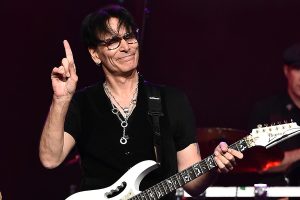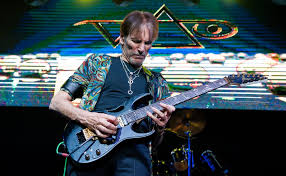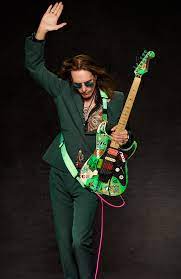HIT CHANNEL EXLCUSIVE INTERVIEW: January 2022. We had the great honour to talk with a legendary guitarist: Steve Vai. Undoubtedly, Steve is one of the great guitarists of all time. On 28 January he is releasing his latest solo album “Inviolate” (Favored Nations/Mascot) and he is going to start another tour. Over the years, he has collaborated with Frank Zappa, David Lee Roth, Whitesnake, Ozzy Osbourne, Al Di Meola, Nelly Furtado and others. Read below the very interesting things he told us:
Why is there no concept or story on “Inviolate” album?
With “Inviolate” I just wanted to be really clean with it and just present songs. A lot of my catalogue has stories in it, heavily produced sometimes, kind of corky, sometimes like in between little bits. For “Inviolate” I just wanted to bring the songs together and wanted them to create their own concept.
 What did you try to achieve musically in “Teeth of the Hydra” using the unconventional Hydra guitar?
What did you try to achieve musically in “Teeth of the Hydra” using the unconventional Hydra guitar?
There is nothing conventional about the Hydra guitar (laughs). When I imagined the guitar, I also imagined that I would create a piece of music on it, that used all the necks in an integrated, linear way. The song needed to be a good song, an enjoyable song on its own, without sounding like a gimmick. I knew that I needed a great melody and I also wanted it to be heavy. So, these were the mental thoughts before I started writing it. I was creating a visual landscape for the song. Then, I knew that I wanted the Hydra to be the only instrument. There are some keyboards and some percussion and stuff, so I had to negotiate a way to create a melody, to create the bass, the 12-string and the harp strings all in one performance and then I recorded it in sections. So, that’s how I did it. Let me show you something. I did this when I was practicing. This is the chorus (ed: he shows me on Zoom a cell phone video playing the Hydra guitar).
Wow! It’s amazing! Will you use this live?
Aha! To me, that’s like a lot of fun. That’s what I am here for! I’m a service provider. I’m here to entertain you. I’m here to give you things that make you go: “Oh, what the hell is that?!”
You are very fascinated with the joint shifting technique that you play in “Candlepower”. Please tell us everything we should know about this song.
Sure. It started out as a little riff I found. I have thousands and thousands of riffs, like if I am gonna go to bed, I have a guitar and I play and if I come across anything, I just record it. So, I just get little snippets (ed: he plays a melody on guitar). So, I had that much of it. That was it and that was on a little snippet. I had this idea in my mind for many-many years for this joint shifting. First, I needed a hardtail guitar, because on a guitar with the whammy-bar if you bend one note, the other notes go flat. So, that doesn’t work. It could, but it’s virtually impossible. The idea was to create a series of bends that the notes went in different directions. So, there were multiple notes were being bent while I was playing other notes and open strings and stuff. To bend a note and play while you are bending a note, it’s not a very unique concept; country players do it all the time. To bend two notes it’s a little more out there, but to bend two notes into different directions and then a third note even, that was the concept. People say I invented this technique, I don’t know about that. I had never seen it, but there is one guitar player, Jerry Donahue (Fotheringay, Fairport Convention), who later on I discovered was doing something similar. But he is a country master, you know. I don’t play anything like that.
With the joint shifting, what I discovered was, when you bend a note, you usually do this (ed: bends a note upwards) and this part of your finger (ed: the first two phalanges –intermediate and proximal, not the distant one which is closer to the fingertip) is on the strings, so those notes are gonna ring. In order to bend a note and don’t have another note ring you have to come straight down more (ed: he bends his fingers more vertical), so there is space under here (ed: the front/inner side of the fingers), so the notes couldn’t ring. But in joint shifting you have to come straight down on the note and then, in order to bend it, without the finger getting in the way of the other strings you have to shift the tip of the joint. If you watch the “Candle Power” video you can see a little bit of that. I only did it in two sections because it’s so hard. It took me a lot of time, but I knew that it was gonna sound wild. You just know. When I was imagining it, I said: “I have to do this, because this is weird. This is gonna sound unlike anything” and that’s what I love doing most on the guitars: coming up with things that just don’t sound conventional, but are musical. They still have to be musical. I did this joint shifting technique in a couple of passages in the song, but what I am hoping is that some younger players with younger fingers and more time, will see that and see the potential in it and take it to another whole level. In my mind, I can see a whole piece of music being performed with that technique and more. I just didn’t have enough time to really go where I wanted to go. Maybe, I will someday but it requires total focus. You have to just focus on that for a year to really get to where I’m thinking. So, whether I end up doing that or not, I don’t know, but I certainly hope that there are some young players that see that and say: “Ah, this is what this guy brought, where can I take it?”
My favourite track from the album is “Avalancha”. It’s one of the best songs you have ever written. What was your inspiration in this?
Thank you. Well, I wanted something really heavy with a great melody. I wanted it to sound ferocious, intense and frenetic, but I wanted it to have a good melody. The drums and the bass -that’s Billy Sheehan (Mr. Big, Sons of Apollo, David Lee Roth) on bass- were recorded back in the “Real Illusions” (2005) days and when I was putting the “Real Illusions” record together I had to make a choice between “Avalancha” and “Building the Church”. So, I chose “Building the Church” and I put “Avalancha” on the shelf for a while but I always knew was there. I always wanted to finish it, so this was a great opportunity. Basically, I had the bass and drums and then I wrote the melody and fleshed out the rest of the song.
 Is “Greenish Blues” a homage to Peter Green (Fleetwood Mac)?
Is “Greenish Blues” a homage to Peter Green (Fleetwood Mac)?
No, it’s not. No. I’m very respectful of Peter Green, obviously, but I’m not a blues player like that. The reason that I called it “Greenish Blues” was because the chord changes sound like blues chord changes, and my playing on that song is sort of bluesy, but it’s not really conventional blues; it’s more my weird eccentricities. The colour green was a colour that I have been using throughout my career in branding certain social media items, almost from the beginning: “Alien Love Secrets” (1995), that green. I ‘ve used that through my whole career on certain things, so the reason that I called the track “Greenish Blues” it would be the equivalent of saying “Vai Blues”.
I’m asking this is because you used to pay homage to other guitar players like this guy in the poster in the background, Stevie Ray Vaughan.
When I did the tribute to Stevie (ed: “Jibboom” from “The Ultra Zone” -1999) was because what I was playing was sort of reminiscent of something that he might do, but Peter Green is a totally accomplished, revered blues player but I wasn’t thinking of him when I was doing this. If I was, I might listen to him and see what some of the sensibilities are and kind of reflect them in my own playing as to pay homage to a great artist with my own voice, but I didn’t do that. Almost all interviews that talk about this song ask me that: “Is this a tribute to Peter Green?” and I say: “No, I never even listened to Peter Green” (laughs). I mean, of course, I did, I know him, but he wasn’t like one of my go-to guitar players. I can’t play blues, anyway (laughs).
How exciting was it for you to record “Knappsack” using only your left hand?
Oh, that was fun. I had this shoulder surgery when I got back home after the drugs were off (laughs). I was in the studio, but I didn’t use this guitar (ed: he grabs a guitar from the sofa), but I got my Onyx Black Pia. So, I had this knapsack, I couldn’t use my right arm, but (ed: he plays with his left hand only) if you have a legato tapping style is not that mysterious. The moment I put my hand on the guitar I said: “Yeah, there is a song in here. There is a song in here. I know it”. I saw the whole thing. Since the idea came, I knew that I can do, so this wasn’t a fantasy. I knew that I had to work on it, but that kind of work is joy because the excitement was all there. It was like a “whoosh!” It’s funny because a lot of times when I get an idea for something creative, if you are listening to the inside of my mind -and I was praying- it would sound something like: “Oh, my God, it’s such a great idea. I just want to do this. God, can you make sure that I live just long enough to finish this? After that, it’s fine, I’m OK, but let me finish this, right? Is that OK?” (laughs) That stupid kind of mind.
 It’s way in the background, but it’s a funny thought: “Let me just get this idea done and then I don’t care” and then after I finish that, another idea comes up: “Oh, the Hydra! God, wait a minute, I ‘ve got to do that! God, can you make sure that I get this done before I die and then I can die, I’m fine”. So, that happened with “Knappsack”, the idea became so compelling and exciting, that there is energy and you want to make sure you get it done, but I was enjoying the process while I was doing it. Then, when I went to record it, there were certain parameters that I knew that I wanted to heed, just like the Hydra. This had to be such a piece of enjoyable music and not sound like a gimmick. I didn’t want that fact that I was doing with the one hand to compromise it as a piece of music and I also needed a good melody. So when I say “I need to write a good melody”, I am saying, for me, I needed to go to the world personally, to write the best melody that I could. So, I had those two ideas and I wanted at times to seem relentless: “Where is this coming from?” “What is that?” “What… is… that?!” (laughs) That’s what I like people to feel when they are watching me.
It’s way in the background, but it’s a funny thought: “Let me just get this idea done and then I don’t care” and then after I finish that, another idea comes up: “Oh, the Hydra! God, wait a minute, I ‘ve got to do that! God, can you make sure that I get this done before I die and then I can die, I’m fine”. So, that happened with “Knappsack”, the idea became so compelling and exciting, that there is energy and you want to make sure you get it done, but I was enjoying the process while I was doing it. Then, when I went to record it, there were certain parameters that I knew that I wanted to heed, just like the Hydra. This had to be such a piece of enjoyable music and not sound like a gimmick. I didn’t want that fact that I was doing with the one hand to compromise it as a piece of music and I also needed a good melody. So when I say “I need to write a good melody”, I am saying, for me, I needed to go to the world personally, to write the best melody that I could. So, I had those two ideas and I wanted at times to seem relentless: “Where is this coming from?” “What is that?” “What… is… that?!” (laughs) That’s what I like people to feel when they are watching me.
You are a very creative person and you always have new ideas.
It’s not that I ‘m overtly creative. I’m not more creative than anybody, but what I do have is the knowing that I can accomplish a creative idea that resonates with me and I don’t let anything to get in the way of it, there is no need to. A lot of people who are very creative don’t trust their own enthusiasm.
What should fans expect from the upcoming Inviolate tour?
What I would hope that they experience when they come to a show is an opportunity to be in an environment with a lot of other people that just want to have a good time and be entertained. I want them to be able to watch a band that is completely present with the music, connected and I want them to feel as they are watching a performer that’s interesting, engaging, joyful and playing beautiful melodies. That’s what I would hope that they experience. As far as the show goes, I’m building a show similar to the way I build other shows. In that, I like to imagine what it would be like if I was in the audience watching my show and what is it that I wanna see, feel and experience? So, as far as the music, this tour is going to allow me to wash out past setlists, because I want to play the whole “Inviolate” record. Also, a handful of the songs that I know people would like to hear like “For the Love of God”, “Tender Surrender”, “Bad Horsie”, a couple of those and then and I would like putting some tracks from the catalogue that I have never played. One of the songs on the list is called “Dyin’ Day” (ed: from 1996’s “Fire Garden”, co-written with Ozzy Osbourne), which we never played and I always wanted to. So, that kind of music. I am trying to create a dynamic flow with the show, so that’s not all just “Chhsss” (ed: makes a heavy hissing sound), not all just sleepy ballads, so it makes up the energy a bit.
 How much has your perspective on guitar changed over the years?
How much has your perspective on guitar changed over the years?
Our perspective on anything has a tendency to shift little by little. So, I guess when I look back through my years of playing the guitar, the way my perspective has shifted, it hasn’t shifted about the instrument. For me, my perspective of the guitar has always been an instrument of infinite creative potential. That has never changed, because that’s what it is. It’s infinite. The way I have changed through the years in my perspective is not so much on the guitar, but on myself as a guitar player. The only way that I can really explain it and I’m sure a lot of people understand this, is that I just feel more free as the years go by. More free to just be myself without any expectations that I might have of the world or the world might have of me or people that are interested. Not the world; I’m unknown virtually in world world. But in the little field of guitar playing that I’m in, you gain freedom. As you get older, you become more friendly with your own creative process and your own creative potential and that’s when it starts to get really-really good.
How challenging is it for you to come up with titles for instrumental pieces?
It’s not very challenging. There is a challenge in it but sometimes I ‘ll come across a phrase or a word that I think it would make a good title for a song, but I don’t have the song. So, then I will build the song based on what that title means to me. “The Teeth of the Hydra” was like that, but a lot of times I will record a song and then I will listen to the song and I will let the song tell me what the title is, something like “Little Pretty”. That was easy. I was listening to it and I said: “What’s your name?” The guitar kept saying: “Little Pretty”, the melody, and then it all came together because the atmosphere of that song is kind of mysterious, there is something nefarious in it, but it’s got some light, too. I kept having this mental image of either the Wicked Witch of the West and Dorothy from the “Wizard of Oz” or the story of Little Red Riding Hood and the Wolf. Do you know what I mean? So, the Wolf is singing “Little Pretty” to Little Red Riding Hood. It’s got this nefarious atmosphere. That’s how the title to that came. Yeah, it’s usually I have a title first or I get started on it and the song is gonna tell you.
Are you currently working on an acoustic album?
Not currently. I started it during the pandemic. I had 15 songs and I recorded the guitars, just simple acoustic guitar for 13 of them. Then, I started doing the vocals and I got about halfway through in it and I had to undergo the shoulder surgery. When I got done with that, it took a while to get my playing back and by then I wanted to get on tour and support a rock instrumental record because I am not gonna tour on a solo acoustic vocal record. You will never even see me doing that (laughs).
Never say never.
OK, fair enough. I agree. You never know.
We have seen Iggy Pop making a jazz album. We have seen everything in our lives.
Yes, but it’s unlikely that you will ever see Steve Vai do a tour where he is singing and playing acoustic guitar only. You never know but it’s unlikely.
 You have your whole life ahead of you. Jeff Beck in the ‘80s started playing fingerpicking. He completely changed his technique when he was 40 years old, after all these great albums.
You have your whole life ahead of you. Jeff Beck in the ‘80s started playing fingerpicking. He completely changed his technique when he was 40 years old, after all these great albums.
That’s because Jeff Beck is the chosen one (laughs). He’s special. You never know anything. I don’t really plan too far in the future. It doesn’t make sense because things are always changing. I just enjoy what I’m doing now and everything seems to work out.
Are you proud that “Passion and Warfare” (1990) is considered a classic album?
Yeah, it’s a great honour. It really is a tremendous honour and there is so much appreciation in that because it’s rare. A record that fits a particular genre, even if it’s old and it’s a classic record, even young people see it as something they at least need to check out. There may even be young guitar players now that think: “Well, I mean, I realy don’t like Steve Vai that much but this record is a classic and everybody says is great and look Wikipedia say it’s great or whatever it is, so I better check it out”. So, that’s a nice place to be, because inevitably when they check it out, they see the value of it.
Why is “Windows to the Soul” (from “The Ultra Zone” -1999) so special to you?
Many of the tracks in my catalogue can touch me more than other tracks. Usually, that’s because I was connected when I was recording it. All the elements came together: The sound, the melody, the solo, the phrasing. The depth of the connection has its lasting effect on you, because when I listen to that song, I hear my connection with it. What I am saying is that my connection with the instrument and the notes is a comment for people that play. You get connected as opposed to moving your fingers in the scales. So, I’m singing that melody and there are a lot of elements came together in the song. It’s a beautiful melody to me. The tone, I don’t know how I nailed that one, but it’s just all there. It has a story in it, it ebbs and flows. There are some techniques in it that I had never done before. Probably another one that’s really special for me –probably it has the most innovation- is “And We Are One” from “Modern Primitive” (2016). That’s the one. That’s the solo, for me. When I listen to that it’s unique, it’s all melody, it’s all phrasing. There are so many things that I did in there that I had never done and I have never heard. Subtle. Very subtle. But that’s what I like to do. These little subtle delicacies become my little secrets for me and sometimes other people discover them.
Why did you give the Ibanez Universe you used on “For the Love of God” to Prince?
(Ed: His intercom rings and he lets the person in). “Yeah, Prince? Yeah, hi. Vai here. Why the hell did I give you that guitar?” I love Prince, I was a big fan and I thought he should have a 7-string, because I would love to see him doing something with it. That was way back and I didn’t think about what guitar I used on what. I had a bunch of them and I said: “I want to give him a 7-string. How about that one?” I didn’t even know that it was the one I played “For the Love of God” on until Mikey Mesker (ed: graphic designer/photographer and longtime Vai collaborator) said: “You know, that’s the guitar that you played” and I was like: “Oh!”, but it’s fine, because I spoke to Prince after he got it. He was very kind and very thankful and he said: “I’m building a room where I’m gonna put all the guitars and things that people send me and that’s where it is gonna live” and I thought that was pretty cool.
 He covered “Tender Surrender” (from “Alien Love Secrets” -1995).
He covered “Tender Surrender” (from “Alien Love Secrets” -1995).
I believe he did. It’s either that or “Villanova Junction” (Jimi Hendrix). I’m not really sure about it. On the box on the CD (ed: a bootleg recorded on a 30 September 2000 concert at Paisley Park Studios) it says “‘Tender Surrender’ by Steve Vai” and he’s playing like the first verse over and over and it sounds like that to me but I don’t know. It would be extraordinary.
What was it like to do the Generation Axe tour with Yngwie Malmsteen, Zakk Wylde & Nuno Bettencourt (Extreme)?
That’s my favourite. Those guys are like brothers and we had a really good time when we toured. They are total professionals. They are totally insane (laughs) in a great way and they are all very confident in what they do and they have all delivered through the years in ultimate ways. They all contributed, they saw the big picture here and we did it and we are doing it. That’s really good. That’s a great opportunity here for us to leave our bands and our solo projects and everything and just get out there. It’s an easy gig. Just hanging around with those guys, it’s so entertaining. It’s so much fun. I love them all dearly.
How important was the period you played with Frank Zappa to your later career?
I was very young when I was working with Frank. So, I was also very observant. I was watching everything he did, that so much of everything I did after that stemmed from watching Frank. I watched the way he conducted his business. Frank was always fair, he never cheated you, he never lied to you or anything like that. He was honest and he was always being creative. Everything was an opportunity to be creative. He was always clever and witty. You never knew what was going to come out of Frank’s mouth, but we all waited to see. He was completely dedicated to his work. One of the things that I got from Frank that I think really stuck with me through my career is that Frank was a free thinker. He wasn’t bound by the beliefs of others, the fearful beliefs and he marched to the beat of his own drum: He would get an idea and he would just do it joyfully without any excuses. So, I thought: “That’s the way you do music, that’s the way you do what you want. You just do it”. Also, Frank on a business level knew how to protect himself as a musician and I learned a lot about that. I learned all about studio watching him, I learned how to edit and record. I mean, I can’t quantify. I was 18 when I started transcribing for Frank and when I was 20 I joined the band, toured with him for 3 years and recorded constantly. So, at that age you are very impressionable.
 You knew Eddie Van Halen quite well. What memories do you have of him?
You knew Eddie Van Halen quite well. What memories do you have of him?
I have a couple of great memories. One time we have been playing softball and that was the first time I got to meet his brother (ed: Alex –drums), who I was very impressed with as a guy and his wife and our kids started to hang out. I was up at Edward’s house once and he showed me the studio and I remember he pointed to one amplifier and he said: “You see that amp, I recorded every single “Van Halen” (1978) song on that head, except two songs”. He had this vault with all these tapes, ceiling to floor and he just took one out and started playing it and it was just Edward sitting down and playing. It was amazing! I was listening to this stuff and I said: “Brother, this is incredible!” I mean, it didn’t even sound so much like to what he did with the band. Of course, his touch was in it but there was some great stuff that we were listening to and we were saying: “Oh, that riff there!” Then, I said: “Why don’t you make a solo record?” and that wasn’t his thing. His thing was: “The guitar parts that I lay down for Van Halen, is my solo record”. He kind of felt that way. Another great experience that I had with Edward: I was in my studio, in my house and I was recording something with my guitar, my pedals, my speakers and my amplifiers and Edward came in. We were hanging out and we were just talking and he was telling me about the thing he was working on and he grabbed my guitar and he started playing. It was remarkable. It sounded exactly like Edward (laughs) and I thought: “How dare you sound like you with my gear!” It was remarkable because it was another opportunity for me to recognise that it’s all in your head. It’s not in the gear or anything like that. Of course, a portion of it is, but the majority of the way you sound it’s in your head. It’s the way you are hearing things in your own mind. That was very apparent to me when Edward was sitting and playing my guitar through all my gear in my studio, in my house.
Rick Wakeman (Yes –keyboards) told me that you had a great time together at Starmus Festival in Switzerland in 2019 with Brian May. Did you enjoy it?
So much. Any opportunity I get to hang with Father Brian is a good one. And Rick is such a monstrous giant of a musician. It was so nice to be able to work with him because I had followed him ever since I was a little kid and it was so nice to be able to actually meet him, work with him, play with him on a one to one level.
A huge “THANK YOU” to Mr. Steve Vai for his time. I should also thank Lauren Schuller for her valuable help.
Main photo: Larry DiMarzio
Official Steve Vai website: https://www.vai.com
Official Steve Vai Facebook page: https://www.facebook.com/stevevai

